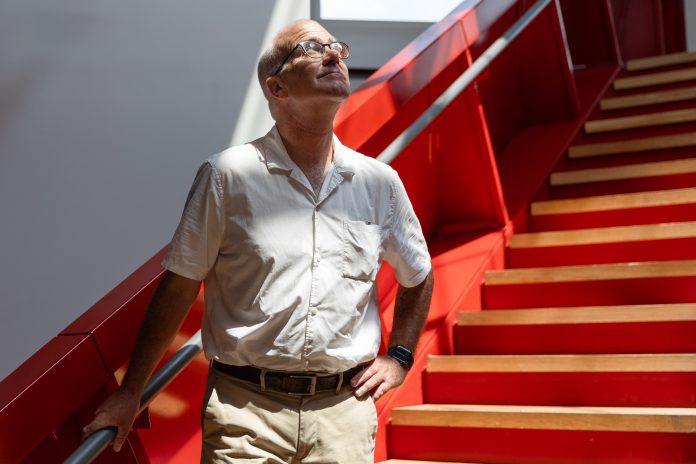While there is still over a year to go before residents head to the polls for the city’s next municipal election, unofficial campaigning has begun with two Kitchissippi residents planning to have their names on the ballot for mayor.
Three-term Kitchissippi Coun. Jeff Leiper said he is strongly considering running against incumbent Mayor Mark Sutcliffe, who is also a Wellington West resident and said he will seek a second term.
Leiper was already planning for this to be his final term as councillor, but started considering running for higher office after feeling discontent with how the city is being run. He most recently voted against the 2025 city budget.
“We are going into the fourth and last budget of this term of council. And as I contemplate that, I’m taking a look at where we are as a city right now. I continue to believe that we are going backwards in terms of the services that residents expect and deserve,” Leiper told the Kitchissippi Times.
“I’ve been a city councillor for 10 years now and there’s been no diminishment in the number of emails and notes that come into me with respect to things like sidewalks that are not being maintained, garbage cans in parks that are overflowing, slow bylaw response when people have concerns,” he added. “I think most residents consider that we’re in a worse place today than we were a decade ago.”
One of Leiper’s most passionate files is transit. In 2024, OC Transpo ridership increased seven per cent with almost 68 million trips taken. But that is still significantly lower than before the COVID-19 pandemic. The new year brought price hikes with single-ride fares now costing $4.00. Seniors fares, which were supposed to see a 120 per cent increase, instead only went up 19 per cent to $58.25 a month.
This April, OC Transpo also launched ‘New Ways to Bus’ which changed 80 per cent of routes and reduced service by 74,000 hours a year. Leiper felt that was a wrong decision and said it would not set the transit organization up for future growth.
“I think matching the transit service to the lower revenues sets us up poorly to ensure that transit is a great option moving forward. One of the emblematic discussions that we had was with respect to LRT frequency. Last year, OC Transpo reduced its service frequency on the LRT from four minutes to 10,” recalled Leiper. “I brought a motion to council to try to restore those hours. It would have been a relatively small investment, but council was unwilling to do that. And I didn’t have the Mayor’s support in doing that.”
There are also some big projects on the table that Leiper is opposed to. This fall, city council will vote on whether or not to build Lansdowne 2.0 which would include a reduction in greenspace, a smaller arena, and no covering over the southside stands.
Mayor Sutcliffe has been adamant with his support, saying it’s not a cost but an investment for the city that would drive jobs, housing, and economic sustainability. But only four councillors need to change their vote for the plans to fall through.
Leiper has been adamant with his opposition to the development from the start, but says that has only grown with the recent success seen with the Ottawa Charge PWHL hockey team.
“I attend most PWHL games at the arena at TD Place. I see how packed that arena can get. And I see the potential that, as the PWHL gains traction, at some point we would regret reducing the size of that arena by a couple of thousand people,” he said. “There is also the question of the financing for the deal. We were assured in Lansdowne 1.0 that the financing would work out a certain way, and that there would be dividends for the city, for its contribution of the facilities into that partnership. We’ve seen that those haven’t been borne out.”
The difficulty attracting suburban votes
Perhaps one of Leiper’s greatest challenges will be winning over support from suburban parts of the city which typically vote for a more Conservative-leaning Mayor. In the 2022 municipal election, left-leaning Mayoral candidate Catherine McKenney took 37 per cent of the vote, with Sutcliffe taking a small majority of 51.3 per cent.
In winning, Sutcliffe took all but five of the city’s 24 wards with McKenney getting a majority of votes in the core with Kitchissippi, Somerset, Rideau-Vanier, Rideau-Rockcliffe, and Capital wards.
But Leiper wants to remind everyone that he grew up in Orleans and understands that each part of the city has its own unique challenges.
At the beginning of his council reign, he was more likely to vote against development applications, but now as the chair of planning and with years of experience under his belt, the urban councillor said he takes a “more pragmatic approach to land use” given municipal limitations with the direction upper levels of government are taking.
Leiper also said urban and rural voters care about the same delivery of services which they pay taxes for.
“I think the sense is that those services are getting worse right across the city. And that may manifest itself differently in different parts of the city,” he said. “That could be overflowing garbage cans, potholes that are increasing or roads that are not being well maintained.”
“And of course, transit right across the urban and suburban area is a critical question. For many suburbanites, their choice in order to get downtown is either take public transit or drive,” Leiper added. “When public transit is not a compelling choice, then they have no choice but to drive. We hear right across the city about the increasing congestion and the frustration that that creates and the diminishment of the quality of life.”
